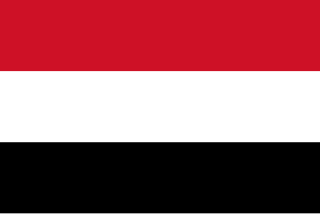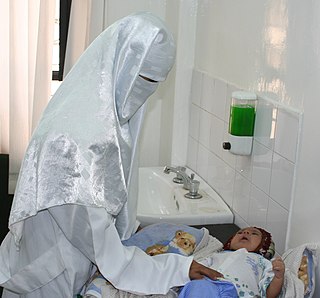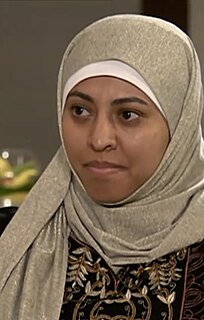Related Research Articles
A fatwā is a legal ruling on a point of Islamic law (sharia) given by a qualified jurist in response to a question posed by a private individual, judge or government. A jurist issuing fatwas is called a mufti, and the act of issuing fatwas is called iftāʾ. Fatwas have played an important role throughout Islamic history, taking on new forms in the modern era.

Yemen, officially the Republic of Yemen, is a country in Western Asia, on the southern end of the Arabian Peninsula. It borders Saudi Arabia to the north and Oman to the northeast and shares maritime borders with Eritrea, Djibouti, and Somalia. It is the second-largest Arab sovereign state in the peninsula, occupying 555,000 square kilometres. The coastline stretches for about 2,000 kilometres. Yemen's constitutionally stated capital, and largest city, is the city of Sanaa. As of 2021, the population of the country is estimated at 30,491,000.

Taiz is a city in southwestern Yemen. It is located in the Yemeni Highlands, near the port city of Mocha on the Red Sea, at an elevation of about 1,400 metres (4,600 ft) above sea level. It is the capital of Taiz Governorate. With a population of over 600,000 in 2005, it is the third largest city in Yemen after the capital Sana'a and the southern port city of Aden.
Gender equality, also known as sexual equality or equality of the sexes, is the state of equal ease of access to resources and opportunities regardless of gender, including economic participation and decision-making; and the state of valuing different behaviors, aspirations and needs equally, regardless of gender.

The General Union of Syrian Women (GUSW) was founded in 1967 with Saud al Abdallah serving as the original president. It aimed to mobilize women while developing their education, political activism, and skills that helped women become more effective members in socio-economic settings. While Syrian women have historically held more rights when compared to the rest of the Arab world, the GUSW is working to put an end the isolation and marginalization of Syrian women as well as involve women to become more of an effective population in society. This movement was born out of the unification of various welfare associations, volunteer organizations, and welfare groups caused by various political shifts in Syria.

The experiences of Muslim women vary widely between and within different societies. At the same time, their adherence to Islam is a shared factor that affects their lives to a varying degree and gives them a common identity that may serve to bridge the wide cultural, social, and economic differences between them.

Amat Al Alim Alsoswa is a Yemeni journalist, and Yemen's first female ambassador and minister.
Equity feminism is a form of liberal feminism that advocates the state's equal treatment of women and men. Equity ensures equality between everyone without challenging inequalities perpetuated by employers, educational and religious institutions, and other elements of society. The concept has been discussed since the 1980s. Equity feminism has been defined and classified as a kind of classically liberal or libertarian feminism, in contrast with social feminism, difference feminism, gender feminism, and equality feminism.

Women in Yemen have historically been placed at a disadvantage due to their gender, with a highly patriarchal society. Although the government of Yemen has made efforts that will improve the rights of women in Yemen, many cultural and religious norms, along with poor enforcement of this legislation from the Yemeni government, have prevented Yemeni women from having equal rights to men.
State feminism is feminism created or approved by the government of a state or nation. It usually specifies a particular program. The term was coined by Helga Hernes with particular reference to the situation in Norway, which had a tradition of government-supported liberal feminism dating back to the 1880s, and is often used when discussing the government-supported gender equality policies of the Nordic countries, that are linked to the Nordic model. The term has also been used in the context of developing countries where the government may prescribe its form of feminism and at the same time prohibit non-governmental organizations from advocating for any other feminist program. In this sense it is possible to distinguish between a liberal state feminism found in Western democracies such as the Nordic countries, and a somewhat more authoritarian state feminism that is often also linked to secularism, found e.g. in certain Middle Eastern countries.
The Women's National Committee of Yemen is a government-affiliated body working to empower women. Local Yemenis work on the committee in coordination with national and international partners to safeguard women's fundamental human rights. The Millennium Development Goals provide the framework guiding the committee's main policy priority areas.

Women in Israel comprise 50.26 percent of the state's population as of 2019. While Israel lacks an official constitution, the Israeli Declaration of Independence of 1948 states that “The State of Israel (…) will ensure complete equality of social and political rights to all its inhabitants irrespective of religion, race or sex.”
Sara Hlupekile Longwe is a consultant on gender and development based in Lusaka, Zambia. She was the chairperson of FEMNET between 1997 and 2003. She is the author of the Longwe Framework for Gender Analysis. Longwe describes herself as a radical feminist activist.

Women played a variety of roles in the Arab Spring, but its impact on women and their rights is unclear. The Arab Spring was a series of demonstrations, protests, and civil wars against authoritarian regimes that started in Tunisia and spread to much of the Arab world. The leaders of Tunisia, Egypt, Libya, and Yemen were overthrown; Bahrain has experienced sustained civil disorder, and the protests in Syria have become a civil war. Other Arab countries experienced protests as well.

Women in Syria constitute 49.4% of Syria's population, and are active participants not only in everyday life, but also in the socio-political fields.

The Inter-American Commission of Women, abbreviated CIM, is an organization that falls within the Organization of American States. It was established in 1928 by the Sixth Pan-American Conference and is composed of one female representative from each Republic in the Union. In 1938, the CIM was made a permanent organization, with the goal of studying and addressing women's issues in the Americas.

Amatalrauf "Raufa Hassan" al-Sharki was an educator, feminist and human rights activist from Yemen. She was a professor of mass media and the director of a Women's Studies Center at the University of Sana'a. Al-Sharki was the first female journalist in Yemen and wrote a regular newspaper column for many years.

Nadia Al-Sakkaf is a former Yemeni Minister and politician. She was the editor in chief of the Yemen Times from 2005 until 2014, before becoming Yemen's first female Minister of Information. She fled Yemen in 2015 after the coup and is currently an independent researcher in politics, media, development and gender studies based in the United Kingdom. In 2011, Al-Sakkaf gave a popular TED talk called "See Yemen through my eyes" which had over 3 million views.
References
- ↑ Al-Mohattwari, Asma (1 March 2015). "Yemeni Women Dream of an Equal, Modern and Stable State". National Yemen. Retrieved 5 August 2015.
- 1 2 "Yemeni Women's Union". Nakweh. Retrieved 5 August 2015.
- 1 2 3 4 Talhami, Ghada Hashem (2013). Historical Dictionary of Women in the Middle East and North Africa. Lanham, Maryland: Scarecrow Press, Inc. p. 362. ISBN 9780810868588.
- ↑ Department of State (2006). Country Reports on Human Rights Practices for 2006. United States Government. p. 2236. ISBN 9781437905229 . Retrieved 5 August 2015.
- ↑ "YWU, German Embassy Discuss YWU Projects". Arabia 2000. 24 August 2009. Retrieved 5 August 2015– via Newspaper Source - EBSCO.
- ↑ Elsanousi, Madga Mohammed (2004). "Strategies and Approaches to Enhance the Roles of Men and Boys in Gender Equality: A Case Study from Yemen". In Ruxton, Sandy (ed.). Gender Equality and Men: Learning from Practice. Oxford: Oxfam GB. pp. 169–170. ISBN 0855985143.
- ↑ Murray, Rebecca (5 January 2013). "Yemeni Women Struggle to Step Forward". Inter Press Service. Retrieved 5 August 2015.
- ↑ Qaed, Samar (27 May 2013). "Need Help? Hotlines Provide Safe Space for Yemeni Women". Yemen Times. Retrieved 5 August 2015.
- ↑ "Yemen Long Battle With Illiteracy". Yemen Post. 7 March 2013. Retrieved 5 August 2015.
- ↑ Raab, Michaela (November 2012). Ending Violence Against Women: An Oxfam Guide. Oxford: Oxfam International. p. 6. ISBN 9781780772318 . Retrieved 5 August 2015.
- ↑ Green, Duncan (2008). From Poverty to Power: How Active Citizens and Effective States Can Change the World. Oxford: Oxfam International. p. 98. ISBN 9780855985936.
- ↑ "Yemeni Group Slams Fatwa Banning Female MPs". Al Arabiya News. 21 July 2008. Retrieved 5 August 2015.
- ↑ Al-Sakkaf, Nadia (28 August 2014). "Politics of Qat by Peer Gatter: The Long Awaited Conference on Qat - 2002". Yemen Times. Retrieved 5 August 2015.
- ↑ Marina De Regt (2007). Pioneers Or Pawns?: Women Health Workers and the Politics of Development in Yemen. Syracuse University Press. p. 103. ISBN 978-0-8156-3121-7.
- ↑ Manea, Elham (2011). The Arab State and Women's Rights: The Trap of Authoritarian Governance. New York: Routledge. p. 119. ISBN 9780415617734.
- ↑ Burrowes, Robert D. (2010). Historical Dictionary of Yemen (2nd ed.). Lanham, Maryland: Scarecrow Press, Inc. p. 188. ISBN 9780810855281.
- ↑ "Amat Al Alim Alsoswa". Center for International Private Enterprise. Retrieved 5 August 2015.